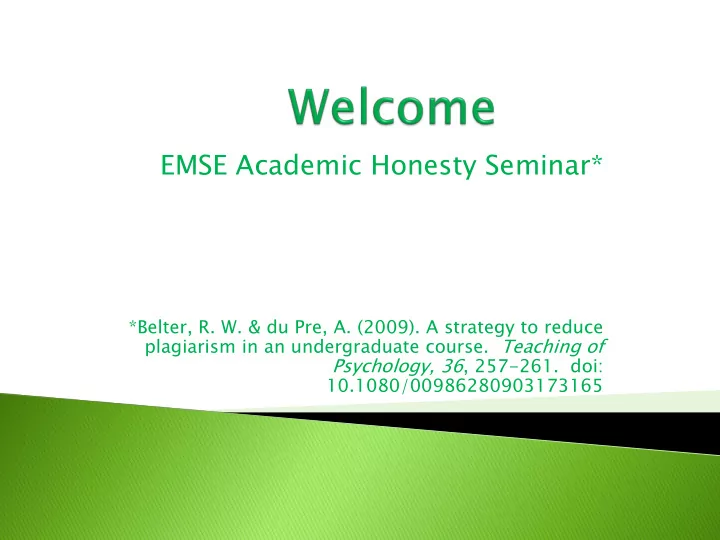

EMSE Academic Honesty Seminar* *Belter, R. W. & du Pre, A. (2009). A strategy to reduce plagiarism in an undergraduate course. Teaching of Psychology, 36 , 257-261. doi: 10.1080/00986280903173165
“…to integrate education and research to create and convey knowledge to solve problems for our State and the technological world. Each student and alumni is part of that mission. S&T students and graduates are expected to solve these problems in morally responsible and transparent ways that don't tarnish the reputation of the institution or diminish the value of an S&T degree.” (Office of Undergraduate Studies; http://ugs.mst.edu/academicintegrity/studentresources-ai/)
“Taking someone else's work (words, ideas, artistic creation, etc.) and presenting it as your own, without crediting that person properly. Stealing somebody else's intellectual property. In any academic work that you do, you are expected to present your original ideas as your own, and to identify any ideas that come from other sources with clear citation and reference .” Belter & du Pre (2009)
“Never cut & paste from online or other electronic documents ◦ Devise your own note-taking system and delineate which words are yours and which are the author’s Paraphrase properly ◦ You must substantially change the sentence structure & wording” Belter & du Pre (2009)
“Give proper credit to the original author ◦ Even if you do not use their exact words If you use someone else’s exact words, you must put them in quotation marks Do not over-rely on direct quotes ◦ You are evaluated on your ability to synthesize ideas and write skillfully” Belter & du Pre (2009)
“Be ready to produce your resources Do not send or give your written work to other students ◦ You do not want to be suspected of knowingly assisting another student commit plagiarism For group projects, clearly document the contribution of each group member Contact your course instructor if you are uncertain about course requirements” Belter & du Pre (2009)
“Giving to someone else or receiving from someone else, information or material that is to be considered in grading academic work. This includes giving or receiving test or homework answers, using unauthorized materials for a test, assisting anyone in the process of cheating, and allowing someone else to cheat .” Belter & du Pre (2009)
“Clearly review the course syllabus ◦ It is your responsibility to be fully informed of the course requirements Give yourself sufficient time to prepare for tests and assignments Don’t cut corners just to take the easy way out ◦ Trying to get away with not doing the required work is cheating because you are claiming credit for something that you did not do” Belter & du Pre (2009)
“Never allow anyone to do your work for you and never agree to do someone else’s work for them Never use materials or resources unless specifically authorized by the instructor Never permit other students to cheat ◦ If you become aware of cheating and do not take appropriate steps to prevent it or report it you become an accomplice” Belter & du Pre (2009)
“Don’t associate with students who cheat Develop a personal commitment to integrity ◦ Be an example of integrity for other students You will impress others You will get more out of your education You will feel genuinely proud of your accomplishments” Belter & du Pre (2009)
“interfering with, modifying or destroying the work or intellectual property of another member of the University without permission” (Office of Undergraduate Studies; http://ugs.mst.edu/academicintegrity/studentresources-ai/)
There is a formal process for reporting acts of academic dishonesty and student misconduct on the campus of Missouri S &T. If academic dishonesty is suspected, the first step is typically a meeting with the course instructor to discuss the matter. If the instructor finds sufficient grounds for academic misconduct the Vice Provost for Graduate Studies (VPGS) will be notified. (Office of Undergraduate Studies; http://ugs.mst.edu/academicintegrity/studentresources- ai/)
The VPGS will then conduct an investigation. This includes a meeting with the student to inform them of their rights and options and review the results of the investigation and proposed sanctions. The student then has seven days to accept or reject the informal disposition. Sanctions may include a failing grade for the assignment or the class, probation, loss of privileges, discretionary sanctions, university dismissal, university suspension and university expulsion. (Office of Undergraduate Studies; http://ugs.mst.edu/academicintegrity/studentresources-ai/)
Go to the EMSE Seminar web page Complete the Academic Honesty Affidavit Submit the affidavit to EMSE via email or in person to 223 Engineering Management Electronically-generated signatures are not accepted
Recommend
More recommend